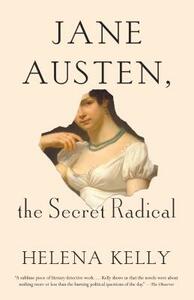Take a photo of a barcode or cover
adventurous
emotional
funny
hopeful
informative
inspiring
reflective
relaxing
medium-paced
A really amazing read. Kelly is now and forever my go to for anything relating to Jane Austen, her work and even the Regency period in England. The books offers a clear analysis of works that are well known, like Pride and Prejudice; and works that are less known, like Northanger Abbey. The amount of knowledge in this book is so finely woken and firmly packed, that the book should weight 100lbs rather than the 296 pages it ends up being.
The writing itself can seem to go on and the sentences run on and on, seemingly with no point. Kelly packs so much information into a sentence that it can be hard to remember what the original point was.
Kelly does a good job of understanding Jane Austen through what we know, mostly by deeply analysing her books, but references letters, books and reviews to understand the context of Jane's works. It's honestly the only way I think I could appreciate her works today, through this deep understanding of context. Makes the movies more interesting too.
The writing itself can seem to go on and the sentences run on and on, seemingly with no point. Kelly packs so much information into a sentence that it can be hard to remember what the original point was.
Kelly does a good job of understanding Jane Austen through what we know, mostly by deeply analysing her books, but references letters, books and reviews to understand the context of Jane's works. It's honestly the only way I think I could appreciate her works today, through this deep understanding of context. Makes the movies more interesting too.
Very good, I can't say I agreed with everything, but I don't have to to enjoy a book.
I wouldn't recommend the audio version. Why didn't they get an English person to read?
I wouldn't recommend the audio version. Why didn't they get an English person to read?
It's unbelievable how many factual errors there are in this book - did nobody edit it? Kelly refers to the title of Earl as rare, there being only a "handful" of them in England, despite there being 191 earls today, excluding courtesy titels. Why not look up how many there are before making such a statement, that could have easily been omitted?
Most glaringly thought, she connects a review of Elizabeth Bennet descriping her as the "Beatrice of the tale" with the heroine of Shakespeare's As You Like It - but hold on, that one's named Rosalind. Beatrice is found in Much Ado About Nothing.
When Kelly gets such basic facts wrong, how can I trust her analyses, often based not on Austen's text at all but rather on forced connections to other texts written during the same time?
Underlying the wild speculations are observations that are worth further investigating, but when an author says two characters are "bitching" about another, she loses her academic cred and her work becomes baseless speculation.
Most glaringly thought, she connects a review of Elizabeth Bennet descriping her as the "Beatrice of the tale" with the heroine of Shakespeare's As You Like It - but hold on, that one's named Rosalind. Beatrice is found in Much Ado About Nothing.
When Kelly gets such basic facts wrong, how can I trust her analyses, often based not on Austen's text at all but rather on forced connections to other texts written during the same time?
Underlying the wild speculations are observations that are worth further investigating, but when an author says two characters are "bitching" about another, she loses her academic cred and her work becomes baseless speculation.
Firstly, please, please, please, can we stop writing books that claim to 'read Jane Austen in a new manner', books that claim we have been reading Austen 'completely wrongly', books who revel in finding the smallest details and blowing them up completely into a new reading.
Jane Austen, the Secret Radical manages to find some very interesting angles and, indeed, legitimate proof for some of its interpretations. The presence of the militia in Meryton as a threatening rather than aiding presence is explicated excellently, emphasising the fear of war as well as the danger of having so many single men cavorting about the streets with little to do.
However, the book incidentally reads so closely that I felt it lost the bigger picture, as with the Persuasion chapter and its focus on fossils and evolution. Interesting, though not in the least credible to me, unfortunately.
All in all, recommended if you are knee-deep in Austen studies and familiar with many theories on her novels and its deeper layers and wish to be just a little bit surprised, but to be taken with some grains of salt.
Jane Austen, the Secret Radical manages to find some very interesting angles and, indeed, legitimate proof for some of its interpretations. The presence of the militia in Meryton as a threatening rather than aiding presence is explicated excellently, emphasising the fear of war as well as the danger of having so many single men cavorting about the streets with little to do.
However, the book incidentally reads so closely that I felt it lost the bigger picture, as with the Persuasion chapter and its focus on fossils and evolution. Interesting, though not in the least credible to me, unfortunately.
All in all, recommended if you are knee-deep in Austen studies and familiar with many theories on her novels and its deeper layers and wish to be just a little bit surprised, but to be taken with some grains of salt.
informative
reflective
medium-paced
I’d love to annotate and research this
informative
reflective
slow-paced
3.5, rounding up.
I found this to be an interesting read; the examination of Jane Austen's work felt like something from a college class, which is something I've missed over the past few years--an in-depth examination and discussion of themes over the course of an author's repertoire. Each Austen novel has a chapter dedicated to it, discussing overall themes and symbols and pointing out language that likely goes over the heads of contemporary readers.
Admittedly, I don't know a lot about Austen-era Britain, so I learned a lot while reading this and found it pretty eye-opening. People have an idea of who Austen was and the works that she wrote, but this book shows how intelligent and careful she was with her writing. There were a few times I found arguments to be a bit of a stretch, but almost everything else seemed pretty accurate.
One thing I would have appreciated was an acknowledgment that a lot of what Kelly was describing regarding class and gender only applied to white people; obviously an in-depth look at POC in Austen-era England would have been out of place, as Jane and her characters were all white, but any indication that the customs and rules being described were different for men and women of color. The Mansfield Park chapter discusses slavery, because that's what Jane was condemning with that book, but other than that, there's nothing about POC. Even that chapter says things like this:
It's laughable, or would be if we had no idea of the horrors that lie beneath it--the clinking of chains, the stench of bodies pressed together in their own urine and feces and vomit, the ceaseless movement of the sea, what waited at the journey's end.
...and, you know, the fact that they were fucking SLAVES. The conditions on the slave ships shouldn't be the big horror. Slavery itself was the big horror, and treating slavery like it's a historical thing to be studied (the same way the revolutions and issues with the church are treated in the examinations of Austen's works) rather than a horrible and disgusting part of the world's history is doing a disservice to people of color.
Anyway, I recommend this if you're an Austen fan. I learned a lot, and now I'm really disappointed that Austen died before she finished her book about a mixed-race character.
I found this to be an interesting read; the examination of Jane Austen's work felt like something from a college class, which is something I've missed over the past few years--an in-depth examination and discussion of themes over the course of an author's repertoire. Each Austen novel has a chapter dedicated to it, discussing overall themes and symbols and pointing out language that likely goes over the heads of contemporary readers.
Admittedly, I don't know a lot about Austen-era Britain, so I learned a lot while reading this and found it pretty eye-opening. People have an idea of who Austen was and the works that she wrote, but this book shows how intelligent and careful she was with her writing. There were a few times I found arguments to be a bit of a stretch, but almost everything else seemed pretty accurate.
One thing I would have appreciated was an acknowledgment that a lot of what Kelly was describing regarding class and gender only applied to white people; obviously an in-depth look at POC in Austen-era England would have been out of place, as Jane and her characters were all white, but any indication that the customs and rules being described were different for men and women of color. The Mansfield Park chapter discusses slavery, because that's what Jane was condemning with that book, but other than that, there's nothing about POC. Even that chapter says things like this:
It's laughable, or would be if we had no idea of the horrors that lie beneath it--the clinking of chains, the stench of bodies pressed together in their own urine and feces and vomit, the ceaseless movement of the sea, what waited at the journey's end.
...and, you know, the fact that they were fucking SLAVES. The conditions on the slave ships shouldn't be the big horror. Slavery itself was the big horror, and treating slavery like it's a historical thing to be studied (the same way the revolutions and issues with the church are treated in the examinations of Austen's works) rather than a horrible and disgusting part of the world's history is doing a disservice to people of color.
Anyway, I recommend this if you're an Austen fan. I learned a lot, and now I'm really disappointed that Austen died before she finished her book about a mixed-race character.
I thought I was cool because I read Pride and Prejudice before watching any of the adaptations - and don't get me wrong, I enjoy the adaptations (yep, especially the zombie one) - but even without those being my default, I still had barely any of the historical and political context to appreciate it (and it's siblings) as Kelly suggests Jane meant us to. And, as Kelly also suggests, Jane's contemporary audience largely didn't either (due to publication delays)... aka, Jane Austen has always been underrated?
I liked the structure (a chapter assigned to each of Jane's published books, but still cross referencing each other) and it was genuinely informative and thought provoking, but it could have been more concise for my taste (language on the flowery side, which instead of being transportive is distracting when trying to think analytically). And Kelly prefaces everything by challenging some common held beliefs about Austen's life that there isn't very solid basis for, but she still does her fair share of speculation... from what mostly seems like solid stuff (i.e. the socio/political climate she wrote them in, which were not necessarily, as mentioned above, the ones they were published in) but which sometimes felt like a reach (albeit interesting ones).
There are some indignant reviews about some things that Kelly reads into, but Jane isn't around to settle any debates, and ultimately a book means to a reader what they want it to mean. All that being said, I don't know if I actually "liked" this book or if I just found the information being used to support Kelly's claims helpful - either way I'm looking forward to eventually rereading Austen's works with some new perspective.
"Forget the Jane Austen you think you know. Forget the biographies; forget the pretty adaptations. Ignore the banknote. Read Jane's novels. They're there to speak for her: love stories, yes, though not always happy ones, but also the productions of an extraordinary mind, in an extraordinary age."
PAGE 293
I liked the structure (a chapter assigned to each of Jane's published books, but still cross referencing each other) and it was genuinely informative and thought provoking, but it could have been more concise for my taste (language on the flowery side, which instead of being transportive is distracting when trying to think analytically). And Kelly prefaces everything by challenging some common held beliefs about Austen's life that there isn't very solid basis for, but she still does her fair share of speculation... from what mostly seems like solid stuff (i.e. the socio/political climate she wrote them in, which were not necessarily, as mentioned above, the ones they were published in) but which sometimes felt like a reach (albeit interesting ones).
There are some indignant reviews about some things that Kelly reads into, but Jane isn't around to settle any debates, and ultimately a book means to a reader what they want it to mean. All that being said, I don't know if I actually "liked" this book or if I just found the information being used to support Kelly's claims helpful - either way I'm looking forward to eventually rereading Austen's works with some new perspective.
"Forget the Jane Austen you think you know. Forget the biographies; forget the pretty adaptations. Ignore the banknote. Read Jane's novels. They're there to speak for her: love stories, yes, though not always happy ones, but also the productions of an extraordinary mind, in an extraordinary age."
PAGE 293
https://alittlebookshouting.com/2019/07/17/four-ways-of-looking-at-jane-austen-7-16-19/





